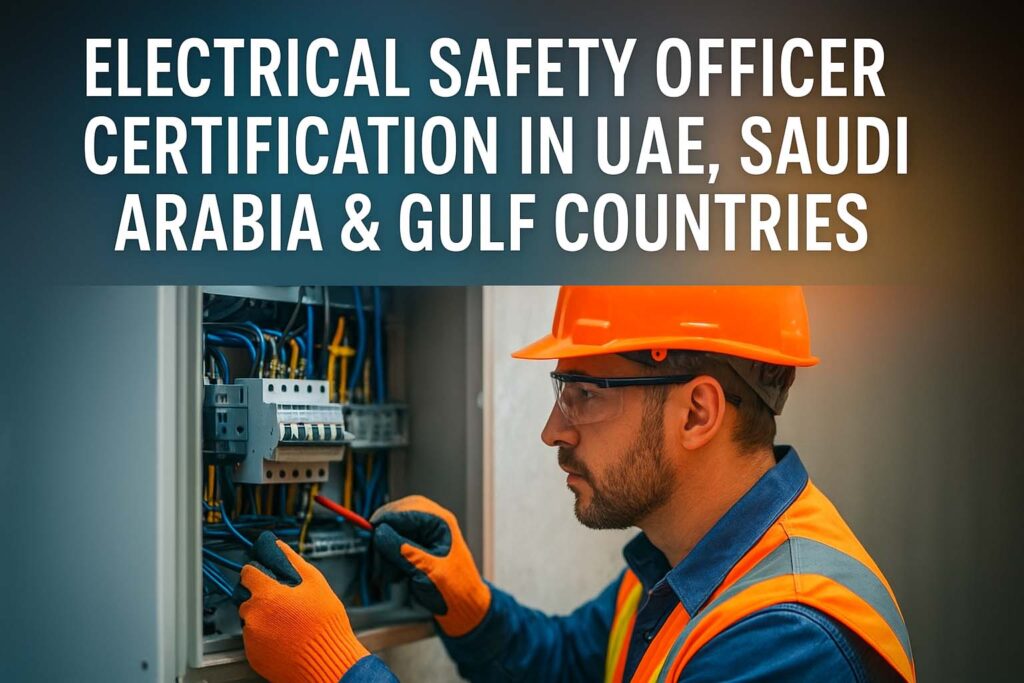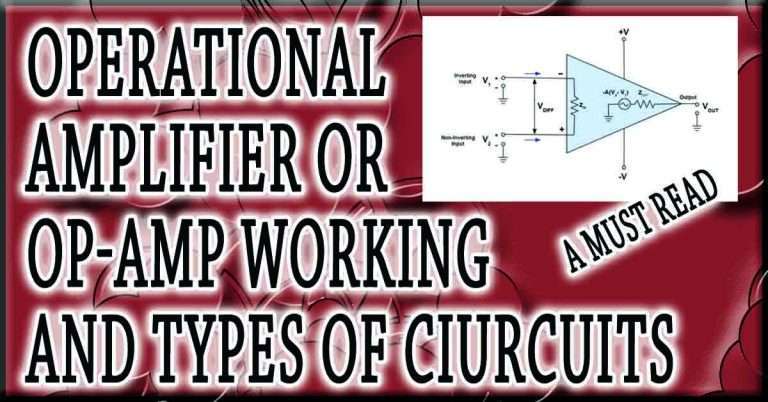Electrical Safety Officer Certification in UAE, Saudi Arabia & Gulf Countries
Electrical safety is a critical aspect of industrial operations in the Gulf region. With rapid infrastructure development and expansion of oil, gas, and power sectors, the demand for qualified electrical safety officers has surged. Companies in the UAE, Saudi Arabia, and other Gulf countries seek professionals who can ensure compliance with international safety standards. This makes Electrical Safety Officer Certification in UAE, Saudi Arabia & Gulf Countries an important qualification for engineers, technicians, and safety professionals.
Table of Contents
Table of Contents

Understanding how to become certified, what the job requires, and which certifications are recognized in the Gulf is essential for career growth. In this guide, we explore everything about Electrical Safety Officer Certification in UAE, Saudi Arabia & Gulf Countries, including eligibility, recognized programs, job scope, and salary expectations.
Key Takeaways
- Electrical Safety Officer Certification is mandatory in many Gulf countries for safety-related roles.
- Certifications like NEBOSH, OSHA, and IOSH are widely recognized across UAE and Saudi Arabia.
- Electrical safety officers earn between 6,000 to 15,000 AED/month in UAE and 8,000 to 18,000 SAR/month in Saudi Arabia.
- Key job sectors include oil & gas, construction, and power generation.
Now let’s dive deep into the details of Electrical Safety Officer Certification in UAE, Saudi Arabia & Gulf Countries.
Know more about Electrical Safety Officer Certification in USA: Cost, Duration & Job Scope
Why Electrical Safety Officer Certification Matters in the Gulf
The Gulf countries have some of the world’s most ambitious projects, from mega industrial zones to smart cities. Electrical systems power every sector, and any mishap can lead to huge financial losses or fatalities. Authorities like the Ministry of Labor in Saudi Arabia and the Dubai Municipality have strict regulations on workplace safety. Electrical hazards like arc flashes, short circuits, and equipment failures are common risks in heavy industries.
To minimize these risks, companies must hire certified safety professionals. Having an Electrical Safety Officer Certification in UAE, Saudi Arabia & Gulf Countries demonstrates that the candidate understands electrical hazards, risk assessment, and regulatory compliance.
What is an Electrical Safety Officer?
An Electrical Safety Officer (ESO) is a professional responsible for ensuring the safe operation and maintenance of electrical systems in industrial, commercial, and residential projects. Their main role is to prevent electrical accidents through risk assessment, inspection, and implementation of safety protocols.
Key responsibilities include:
- Conducting electrical hazard assessments.
- Implementing lockout/tagout procedures.
- Training staff on electrical safety compliance.
- Investigating electrical incidents and reporting.
- Ensuring compliance with standards like NFPA 70E, IEC, and local regulations.
Know more about Electrical Safety Officer Roles & Responsibilities
Why Certification is Crucial
In the Gulf region, certification is often mandatory for employment in high-risk sectors. For example, oil and gas companies in Saudi Arabia do not allow safety officers on site without approved credentials like NEBOSH or OSHA. Similarly, in the UAE, certifications like IOSH and NEBOSH are minimum requirements for safety roles in large projects.
Recognized Electrical Safety Officer Certifications in Gulf Countries
There are several globally recognized certifications that are accepted in the UAE, Saudi Arabia, and other Gulf countries. The most popular ones include:
| Certification | Issuing Body | Recognition in Gulf |
|---|---|---|
| NEBOSH International General Certificate (IGC) | NEBOSH UK | Highly recognized in UAE, Saudi Arabia |
| OSHA Safety Certification | OSHA (USA) | Widely accepted across Gulf |
| IOSH Managing Safely | IOSH (UK) | Recognized for supervisory roles |
| NFPA Electrical Safety Training | NFPA (USA) | Preferred for electrical safety compliance |
| Diploma in Electrical Safety | Various Accredited Institutes | Accepted in major Gulf projects |
NEBOSH and OSHA remain the most demanded certifications for Electrical Safety Officer Certification in UAE, Saudi Arabia & Gulf Countries because they meet international compliance standards.
Know more about DEWA Electrical License Guide for Solar Projects in Dubai
Eligibility Requirements for Electrical Safety Officer Certification
To enroll in a recognized certification program, candidates generally need:
- A diploma or degree in electrical engineering or related field.
- Basic knowledge of workplace safety practices.
- English language proficiency for international certifications.
Some certifications like NEBOSH do not require formal electrical engineering education, but employers in the Gulf often prefer candidates with technical backgrounds.
Training Structure and Duration
The training for Electrical Safety Officer Certification in UAE, Saudi Arabia & Gulf Countries usually includes:
- Theory Sessions: Electrical hazards, safety standards, PPE requirements.
- Practical Modules: Lockout/tagout procedures, arc flash analysis, equipment isolation.
- Assessments: Written exams and practical demonstrations.
Course duration varies:
- NEBOSH IGC: 10–15 days intensive course.
- OSHA Certification: 30-hour or 10-hour training modules.
- IOSH Managing Safely: 3–5 days.
Know more about NABCEP Certification for Solar Installers: Process & Cost
Electrical Safety Standards in Gulf Countries
To work as an Electrical Safety Officer in the Gulf, you must understand both international and local standards:
- IEC Standards: Widely used across Gulf projects.
- NFPA 70E: Electrical safety standard in workplaces.
- Saudi Aramco Safety Standards: For projects in Saudi Arabia.
- Dubai Municipality Safety Regulations: For UAE-based projects.
Familiarity with these regulations helps in passing certification exams and performing on the job.
Cost of Electrical Safety Officer Certification in UAE and Saudi Arabia
Training cost depends on the certification:
| Certification | Approx. Cost in AED | Approx. Cost in SAR |
|---|---|---|
| NEBOSH IGC | 3,500–6,000 AED | 3,500–6,500 SAR |
| OSHA 30-hour | 1,000–2,500 AED | 1,000–2,500 SAR |
| IOSH | 1,200–2,000 AED | 1,500–2,200 SAR |
Costs vary depending on whether the course is online or classroom-based.
Know more about How to Get Electrical Certification in USA & Transfer It to Europe
Job Opportunities After Certification
Once you complete Electrical Safety Officer Certification in UAE, Saudi Arabia & Gulf Countries, you become eligible for roles such as:
- Electrical Safety Officer
- HSE Officer (Electrical Focus)
- Safety Inspector
- Electrical Compliance Auditor
Top hiring industries:
- Oil & Gas
- Construction
- Power Generation & Transmission
- Manufacturing
Companies like ADNOC, Saudi Aramco, and DEWA regularly post vacancies for certified electrical safety professionals.
Salary Expectations in the Gulf
Electrical Safety Officers in Gulf countries enjoy competitive salaries.
| Country | Salary Range |
|---|---|
| UAE | 6,000–15,000 AED/month |
| Saudi Arabia | 8,000–18,000 SAR/month |
| Qatar | 7,000–14,000 QAR/month |
| Oman | 600–1,200 OMR/month |
Experience, additional certifications, and language skills (English & Arabic) can increase salary potential.
Know more about DEWA Electrical Engineer Exam Questions
Challenges and Tips for Success
While the certification opens doors to great opportunities, there are challenges:
- High competition for premium roles.
- Continuous need to upgrade skills with new standards.
- Physical and mental demands of site work.
Tips for success:
- Add multiple safety certifications like NEBOSH + NFPA for higher employability.
- Gain hands-on experience during training.
- Network with professionals in the Gulf region through LinkedIn and industry events.
Future of Electrical Safety Officer Roles in Gulf Countries
With the Gulf investing heavily in renewable energy and smart grids, the demand for electrical safety professionals will remain high. The UAE aims to generate 50% of its power from clean energy by 2050, while Saudi Arabia’s Vision 2030 is driving massive electrical infrastructure projects. This means Electrical Safety Officer Certification in UAE, Saudi Arabia & Gulf Countries will stay relevant for decades.
Know more about PE License for Electrical Engineers
Final Thoughts
Electrical safety is non-negotiable in the Gulf’s fast-growing industrial landscape. Getting certified is not just about compliance—it’s about building a sustainable and rewarding career. Certifications like NEBOSH, OSHA, and NFPA are your gateway to high-paying roles in some of the most advanced projects in the world.
If you want a stable career in the UAE, Saudi Arabia, or other Gulf countries, start by investing in the right training and credentials. The opportunities are vast, and the future looks promising for certified electrical safety professionals.
Follow Us on Social:
Subscribe our Newsletter on Electrical Insights for latest updates from Electrical Engineering Hub
#ElectricalSafety, #SafetyOfficer, #ElectricalSafetyCertification, #UAEJobs, #SaudiArabiaJobs, #GulfJobs, #SafetyTraining, #ElectricalEngineer, #SafetyCompliance, #OSHACertification, #NEBOSH, #IndustrialSafety, #WorkplaceSafety, #SafetyStandards, #ElectricalTraining


